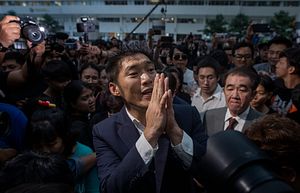Thailand’s Constitutional Court ruled Wednesday that a popular pro-democracy opposition leader violated election laws and cannot keep his seat in Parliament.
The court said Thanathorn Juangroongruangkit, the 40-year-old head of the new Future Forward Party, violated a regulation barring owners of media companies from running for Parliament.
The court rejected Thanathorn’s claim that he sold his holding in a media production company before the deadline needed to be a candidate.
The ruling had been expected. Thanathorn’s party, which finished third in a March general election, has been a thorn in the side of Thailand’s conservative establishment, in whose favor the courts have consistently ruled. The party is disliked by the establishment not only for its anti-military stance, but also because of its strong popularity.
There are many other cases pending against Thanathorn and his party, and there is a widespread belief that the deck is stacked against it and it will end up being disbanded, with its leaders banned from political office for several years.
The ruling against Thanathorn automatically triggers further deliberation by the court into whether he knowingly flouted the rules, and he could face a ban on public office if found guilty.
About 100 fervent supporters mobbed Thanathorn as he arrived for the court hearing and gave him an even more enthusiastic reception on his way out.
“We shouldn’t be concerned. It’s important for us to continue on our campaigns and there are so many things that we have to work on,” Thanathorn told reporters after the ruling. “We should be focusing on what really benefits people. The public can decide for themselves whether or not what happened to us is just.”
Thanathorn was never allowed to take his seat in the lower house of Parliament because of the Election Commission’s preliminary finding that he had violated the law. According to an initial court ruling, he was suspended because he could be guilty as charged, which would be an “obstruction to the important work in the meetings in the House of Representatives.”
However, the court did not suspend 32 members of Parliament from the coalition formed by the pro-military Palang Pracharath Party who faced similar complaints. It said those cases had not been filed and processed by an investigative committee.
On Monday, Thanathorn raised the issue again, announcing he was suing the Election Commission’s members because they had acted improperly by forwarding his case to the Constitutional Court before it was adequately investigated.
Thanathorn had announced before the ruling that he would continue to be active politically no matter what the verdict, and he went from the court to a shopping area where he took part in campaigning for public support for his party’s policy to end military conscription.
The party also is pushing an effort to amend the constitution to make it more democratic. Thailand was under the rule of a military junta from 2014 until earlier this year, and that government pushed through a new constitution to give more power to the military and the courts and senior bureaucrats at the expense of elected office holders.
Thanathorn, a billionaire whose family fortune comes from the auto parts industry, founded his party in March 2018 as Thailand was heading toward an election. The party’s initial support came from youth and young professionals, but it proved to have wider appeal in many parts of the country.
The army staged coups in 2006 and 2014 to attempt to shore up the old ruling class led by a royalist-military alliance. The ruling class’s power was challenged by the rise of billionaire populist Thaksin Shinawatra, whose 2006 ouster by the military set off a long and sometimes violent power struggle between his supporters and opponents.
Prayut Chan-o-cha, who staged the 2014 coup and afterward served as prime minister in the military government, took a second term this year after the Palang Pracharath Party formed a coalition after the election.
The Future Forward Party collaborated with parties allied to Thaksin’s political machine, causing it to be tarred with accusations that it was just a vehicle for Thaksin, who is in exile. It vehemently denies the allegations and has staked out positions independent of its allies.
The party has maintained its gadfly position in Parliament and recently launched a campaign urging people not to accept the status quo and be willing to stand up for their rights.
By Tassanee Vejpongsa and Grant Peck for The Associated Press.

































